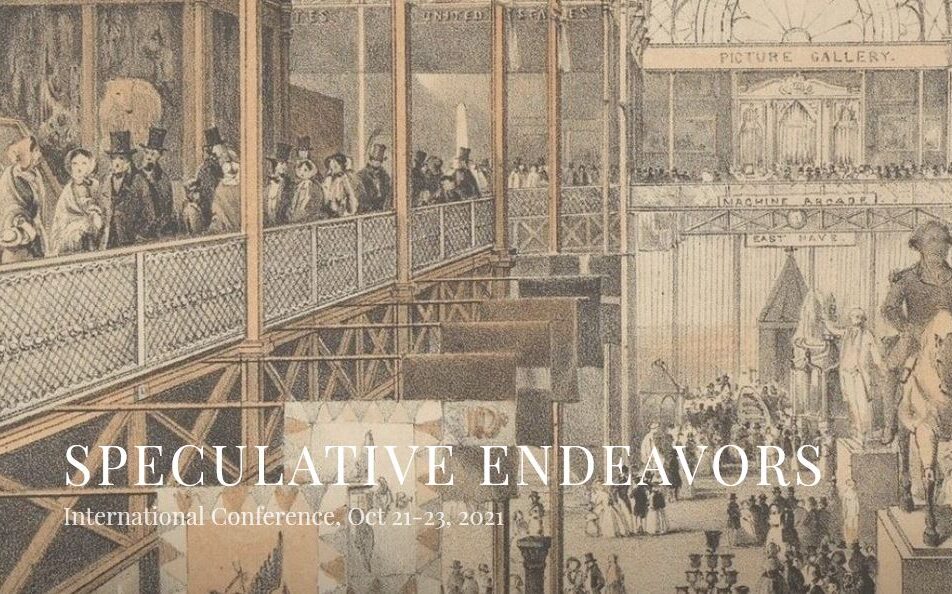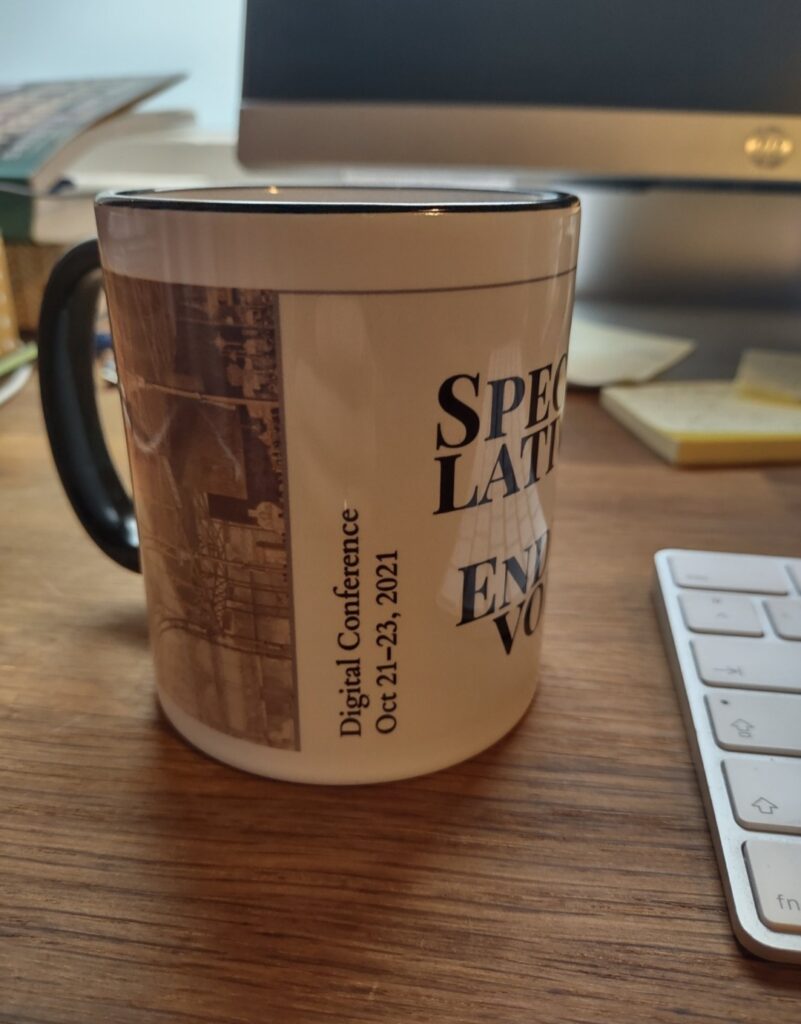Online conference organized by Katrin Horn, Karin Hoepker, and Selina Foltinek at the University of Bayreuth, Oct 21-23, 2021

We may be a bit late with our comment on the project’s conference but not less enthusiastic about its outcome! From October 21-23, 2021, the Speculative Endeavors Conference eventually took place virtually. Last year, we postponed our event in the hope we might meet in person in 2021. Early this year, we made the call that it might be wiser (and safer) to move the conference online. And, sure, the missed conversations over coffe and in the hallways put a little damper on things. In the end, however, we were simply happy to finally meet those people virtually who had sent their fantastic abstracts on a wide range of topics in 2019. The conference planning had certainly come a long way!
Speculative Endeavors examined cultures of knowledge and capital in the US during the long nineteenth century. In particular, presentations focused on illicit, tacit, oral, unofficial, or subjugated knowledges. In the century of the rise of Wall Street, the increasing incorporation of America, and the experience of economic volatility, people sought potential “insider knowledge” about the machinations of markets, and different knowledges competed in times of heightened uncertainty. Practices of speculation, covert informational labor, and related mechanisms of exclusion and inclusion closely regulated access to and speculative value of such knowledge. Heike Paul, the director of the Bavarian American Academy (BAA), kindly offered to start off the conference with a few words on the contemporary context of the the conference topic. As chairs, Sylvia Mayer, Regina Schober, Birte Christ, and Jana Keck guided our speakers and all participants through the panels to align the panelists’ long, pre-circulated papers and short, 7-min Zoom talks. This format allowed us to have extensive, 60min-Q&As which lay the focus on dialogue and exchange, which for us are central to the value of conference. We couldn’t be happier with how all our participants were willing to committed to making this format work! Conference presentations were given by twelve speakers from the US, UK, Austria, and Germany. They covered topics from the areas of rumor & speculation, disenfanchised knowledge (institutions), the trade of private knowledge, and knowledge production in the so-called private sphere.
On the first day, Sebastian Jobs talked about the (deadly) implications of a slave insurrection rumor in North Carolina at the beginning of the nineteenth century. Carrie Tirado Bramen followed with a talk on astrological speculation on Wall Street, exemplified by W. D. Gann and Evangeline Adams. Migration as a form of speculation and migrants’ learning about financial knowledge were the main topics of Atiba Pertilla‘s investigation.
On the second day, Travis Ross spoke to Hubert Howe Bancroft’s company in California as a knowledge industry which was devoted to the economies of scale and subjected to market capitalism prior to academic professionalization. Alexander Starre discussed W.E.B. Du Bois and Jane Addams as negotiating and elevating fringe knowledge in urban sociology at the beginning of the twentieth century. Andrew Erlandson‘s presentation analyzed Pauline E. Hopkins’s approach to editorship and print culture as based on her experiences with the women’s club movement.
For the last day, Karen Adkins emphasized the epistemic and financial credibility assigned to individuals as crucial for productions and consequences of gossip, for which she juxtaposed the gossip about Nancy Randolph and Thomas Jefferson. Katrin Horn and Selina Foltinek examined Grace Greenwood and Anne Brewster as foreign correspondents to illustrate how gossip became a profession – a form of knowledge that columnists could capitalize on in the second half of the nineteenth century. On the basis of floor plans and etiquette books, Carola Bebermeier‘s presentation covered insider knowledge on genteel performances in the parlor as policing access to inner circles. Analyzing children’s toys and education (=”pecuniary pedagogies”), Jaclyn Schultz detected constructions of class and discriminatory ideologies in cultural material that exposed children to the logics and mechanisms of a capitalist economy early on. Serenity Sutherland‘s “Speculative Knowledge and Home Economics” traced Ellen Swallow Richards’s “Right Living” ideology and “euthentics” philosophy which were presented as a domestic science targeting the working class and immigrant groups.
The two keynotes were presented by Lori Merish (Georgetown) on “Fugitive Knowledge: Poverty as Specular, Poverty as Speculation” and by Peter Knight (Manchester) on “Vernacular Epistemologies of the Market.” Lori Merish, an expert on working-class literature, identification, and sentimental materialism, introduced us to knowledge production of the poor with a specific focus on the sentimentalized figure of the poor child in mid-century photography. She discussed the ‘poverty porn’ tradition, oral performance culture, class performances of the carnevalesque as subversion, and documenting as a practice of reform. Peter Knight, an expert on conspiracy theories and market epistemologies, gave a talk on market advice literature as grass-roots economic wisdom. He analyzed vernacular epistemologies that outlined the self as an entrepreneurial subject, envisioned a mastery of the self as a mastery of money, and made the market legible at the end of the nineteenth century.
We particularly valued the interdisciplinary crowd of presenters, who contributed to a lively exchange on methods, archives, and questions of historical continuity and change. One of the shared points of conversations that emerged during the conferences was the status of Karen degraded forms of knowledge vis-a-vis the boundary-work done via institutional forms of knowledge-creation. The contrasting question of how trust and credibility are produced equally resonated across panels and papers. The role of style, form, and register was discussed in various contexts as was the role of new media to the production of various forms of capital.
A final note on social capital: Despite the online format, we did not want to go without socializing during the breaks, which is why we met on wonder.me. All speakers and chairs also received a small gift in the mail – Our attempt at participant bonding. We hope that all will cherish their fond memories of October 2021.

Thank you to all speakers for sharing their work with us and thank you to all participants for attending and discussing nineteenth-century speculative endeavors!
We would also like to thank our student assistants Arunima Kundu, who managed the conference website, and Lisa Kratzer, who helped to transcribe and upload archival documents relevant to our conference talk.
Last but not least, we would like to thank the conference sponsors: Bavarian American Academy, WiN UBT, and the DFG (German Research Foundation)
Currently, we are working on a book proposal on the conference theme, so stay tuned for an edited volume!
(authors: Katrin Horn, Selina Foltinek)